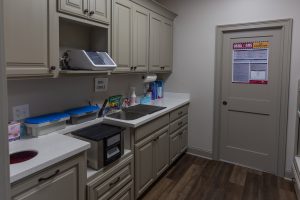 Many patients feel excessive anxiety when they think of going to the dentist. If you have fear of the dentist you are not alone. Our caring staff are passionate about providing dental care to everyone. We can help you make it so fear is not a barrier to the healthy, beautiful smile you deserve. To accomplish this Dr. Kilby has received advanced training in sedation dentistry.
Many patients feel excessive anxiety when they think of going to the dentist. If you have fear of the dentist you are not alone. Our caring staff are passionate about providing dental care to everyone. We can help you make it so fear is not a barrier to the healthy, beautiful smile you deserve. To accomplish this Dr. Kilby has received advanced training in sedation dentistry.
The process is simple. You take a small pill on an empty stomach one hour before your appointment. The pill acts as a mild sedative and relaxes you.
You need someone to drive you to and from the appointment as you will be a little drowsy. We evaluate you to see if you need more medication and then wait until you feel comfortable. We will not begin to work until you are completely relaxed and give us permission to get started.
After we are done and the appointment is over your driver will take you home so you can relax the rest of the day. The next day you will wake up feeling completely normal. Many times, patients have said they do not remember anything about their dental visit.
Oral conscious sedation allows us to get a lot of dentistry done in a short amount of time. Many times we can finish all the dentistry you need in one visit.
What kinds of sedatives are available?
The most popular types of dental sedatives are nitrous oxide, oral conscious sedation, and IV sedation. Different levels of sedation (mild, moderate and deep) can be utilized depending on individual needs. Before administering any sedative, Dr. Kilby and his staff must analyze your full medical history , take note of your current medications, and conduct a comprehensive exam.
Nitrous oxide, or “laughing gas,” is used as a mild sedative. It is delivered through a nose hood, and is administered throughout the entire procedure. Nitrous oxide elevates the general mood and can evoke a general sense of well-being. Most importantly, it relieves anxiety and reduces pain during the procedure. In addition, some tingling and numbness may be felt. There are few side effects associated with nitrous oxide, and it has been safely used in dentistry for many years.

Intravenous sedation is a moderate type of sedation. Patients who have previously experienced IV sedation often report feeling like they slept through the entire procedure. Generally, IV sedation is used for shorter treatments. It is administered via direct injection into the bloodstream, which means the effects are immediate. Sometimes patients feel groggy and sleepy when the IV sedatives are withdrawn. This is why it is important to bring a designated driver for the drive home.

Oral conscious sedation is an excellent choice for people who fear needles. Oral medication is provided prior to treatment in order to induce a moderate state of sedation. Though oral sedatives do not cause sleep, they usually dull the senses. This means that most patients cannot remember the pain, smells or noises associated with the procedure. Usually, a dose of medication is taken prior to the appointment, and then topped up during the procedure as required

Most of the drugs used in sedation dentistry are classified as benzodiazepines. Benzodiazepines reduce anxiety, muscle spasms, insomnia and seizures. Each medication has a different half-life, meaning that the effects last for varying amounts of time. The estimated length of the procedure determines which type of drug is going to be most effective.
Here are some of the most common drugs used in oral conscious sedation:

Valium® – This sedative has amnesic properties and a long half-life. It is usually used for time-consuming, complex procedures.
Halcion® – Usually used to treat insomnia, Halcion is an effective sedative with amnesic properties. A short half-life makes this sedative useful for shorter procedures.
Ativan® – This sedative is best known for reducing anxiety. It has amnesic properties and a medium half-life. Ativan is typically used for treatments shorter than two hours.
Versed® – This sedative has the shortest half-life and is therefore less commonly used. It alleviates anxiety in much the same way as nitrous oxide, and is used for visits that will take less than 30 minutes.
If you have questions or concerns about sedation dentistry, call (229) 247-0200.

